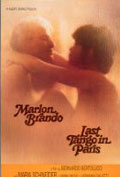
Directed by
Bernardo Bertolucci
129 minutes
Rated MA
Reviewed by
Bernard Hemingway

Last Tango In Paris
Were it not for the infamous “butter” scene in which Marlon Brando’s Paul anally rapes Maria Schneider’s character, Bernardo Bertolucci’s film would never have acquired the status that it has. Not that is isn’t a worthwhile film, it’s just that it’s more thesis -driven than emotionally affecting. And understandably some women will find it offensive.
Brando plays Paul, a middle-aged male living in Paris and trying to comprehend his wife’s very recent suicide. A lost soul wandering the streets he drifts into a vacant apartment and there meets Jeanne (Schneider), a spunky Parisienne (the actress turned 20 while the film was being made) who is looking for a place to live. They have quick, spontaneous sex and the film follows the act's aftermath as the two become embroiled in a psychically-charged relationship. In what is perhaps some kind of private dig, Truffaut's favourite actor, Jean-Pierre Léaud, appears in a subplot as Jeanne’s twittish Nouvelle-Vague-style director boyfriend.
There is a good deal of the Bukowskian in Bertolucci’s story of flophouses, death and degradation and a good deal of Stanley Kowalski in Brando’s loveless, self-pitying Paul but the film is also both symptomatic of the romantic fatalism that characterized European art-house films of the time (examples being Luchino Visconti’s Death In Venice, 1971 and Liliana Cavani’s The Night Porter 1974), a quality well developed by Gato Barbieri's often excessive music and Vittorio Storaro's slow tracking pans and swooping crane shots. It is also a skilful melding of the director’s Marxist and Freudian influenced ideas, the empty apartment where the trysting takes place being for Paul a place where he can abandon bourgeois mores and for Jeanne enact some kind of liaison with her dead father. It is only when the two try to convert their fanatasies into normal life that things go wrong.
The film was a succès de scandale in its day and even though the rape scene is mild by today standards of explicit sex, the brutality of Paul’s treatment of Jeanne is still confronting (Bertolucci acknowledged in 2013 that to achieve realism the scene was non-consensual. Schneider never talked to the director again). It was acknowledged as a Brando-Bertolucci project, a kind of exorcising of their fantasies (although Bertolucci would make an insipidly decorative variant on the theme with 1996’s Stealing Beauty) and Schneider, whose career, if not life, was destroyed by the film is but a puppet (looking like a female Marc Bolan) in their hands, albeit a game one. It is this self-indulgence which robs the film of real emotional substance. We know and believe Paul but there is not enough of Jeanne to constitute a compelling dynamic.
Nevertheless, cinematically, Last Tango is an impressive film, provocative in spirit, skillfully composed and constructed and memorable as Brando’s last major screen role.
Want something different?





